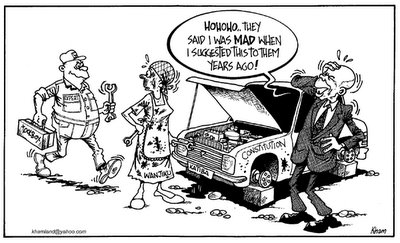CUT and RUN
Over the last couple of months a lot has been said about withdrawing, "redeploying" troops and getting out of Iraq. As if the removal of troops from Iraq shall end Americas commitment or relationship with Iraq.
Americans may not like it, and Iraqis may want American troops out of Iraq, but one thing is for sure, Iraqi's shall need America for the foreseeable future. If one considers the relationship of the former European colonizers and their colonies (especially in Africa), one realizes that the imperial master continues to play a lasting role in the life of the colonized for quite a long period of time after effective colonization is done. Some may quibble with the classification of the current situation in Iraq as that of Colonial master and Colony, but it is what it amounts to.
If you ask the British or the French, they continue to be relied upon by their former colonies to resolve political, economic and military conflicts. Many African countries rely upon their former colonial masters for economic, political and social leadership. Whenever a crisis comes along - in Ivory Coast, Sierrra Leone, etc the former colonial master is likely to play a critical role in resolving the proplems/crisis.
The same goes for Iraq. From now on - till Iraq can stand on her own two feet - Iraqi's shall rely on the Americans to help resolve their political, social, and economic quarrels and problems. Those who believe that withdrawing American troops is the end of America's commitment to Iraq are seriously mistaken and should take a serious look at their expectations of what America's role in the world is.
Americans may not like it, and Iraqis may want American troops out of Iraq, but one thing is for sure, Iraqi's shall need America for the foreseeable future. If one considers the relationship of the former European colonizers and their colonies (especially in Africa), one realizes that the imperial master continues to play a lasting role in the life of the colonized for quite a long period of time after effective colonization is done. Some may quibble with the classification of the current situation in Iraq as that of Colonial master and Colony, but it is what it amounts to.
If you ask the British or the French, they continue to be relied upon by their former colonies to resolve political, economic and military conflicts. Many African countries rely upon their former colonial masters for economic, political and social leadership. Whenever a crisis comes along - in Ivory Coast, Sierrra Leone, etc the former colonial master is likely to play a critical role in resolving the proplems/crisis.
The same goes for Iraq. From now on - till Iraq can stand on her own two feet - Iraqi's shall rely on the Americans to help resolve their political, social, and economic quarrels and problems. Those who believe that withdrawing American troops is the end of America's commitment to Iraq are seriously mistaken and should take a serious look at their expectations of what America's role in the world is.



